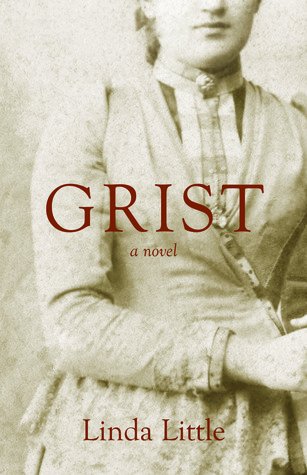There are a couple of things to consider before you venture into the pages of Grist, the gripping and powerful new novel by award-winning author, Linda Little.
First is to make sure you have several uninterruptible hours ahead of you because after just a few lines of the book, I had slipped into the engaging rhythm and exquisite precision and eloquence of Little’s prose. I was lured by the deft and tender touch of her story-telling into the trap that had been set for the “great horse of a girl,” Penelope McCabe, one winter’s night in 1875, and I had no interest in putting Grist down until I’d turned the very last page.
And, even then, I found it difficult to accept that it was time to close the book, re-enter the 21st century and take my leave of the cast of complex and colourful characters that populate the pages of this remarkable historical novel.
And a second note of caution: you may also wish to brace yourself for a rough emotional journey as you step into the world Little so masterfully recreates of the Maritimes at the end of the 19th century and into the first quarter of the 20th.
Although this story is the one that Penelope is telling her granddaughter Rachel (“this is the story of how your were loved”), throughout much of the book any love and pleasure in Penelope’s life are painfully overshadowed and diminished by dreadful loss, grief, immense physical and psychological hardship and her husband Ewan MacLaughlin’s dour, puritanical interpretation of Christian faith, God’s will and life itself.
This is also the story of the burden of being a woman at a time when there were few options besides being a wife beholden and obedient to a husband. And in this case, that husband is a humourless, bullying and unfeeling man, whose first and only love is geometry and figures, engineering and gears of the grist mills he designs, builds and repairs.
There were moments when I felt that Ewan’s unrelenting cold nature and unconscious, almost offhand, cruelty stretched credulity. But I also wondered if his solitary nature, lack of social skills, literal interpretations of scripture, inability to comprehend healthy human interactions and relationships, as well as his genius when it came to shapes and figures, might well have been attributed — had he lived a century later – to a personality disorder or a form of autism.
The power — and also the tragedy — of this story come from the loveless marriage between Penelope with her creative, kind and caring spirit (“I thought happiness grew naturally like ivy along the walls or dandelions in low grass, or hedgerows ringing the fields and pastures”) and the tragic, rigid and emotionally handicapped Ewan.
As a child, he was once punished for losing himself in the magic of geometrical and mathematical imaginings, warned that he had to “guard against his filthy daydreaming nature.” He was raised believing that misfortune as God’s punishment for sin or sloth, that there was “no greater sin than the wasting of good daylight.”
In one touching and tragically comic scene, husband and wife take to their knees on either side of the bed to pray to the Holy Father to forgive and help each other see the error of their ways, in “duelling vespers,” a game that Penelope could not win.
In this, Little’s third novel and also her third set in rural northern Nova Scotia that she has made her home, she masterfully captures the hardships that settlers faced as they tried to carve out their lives — clearing and cultivating land, hewing wood and harnessing rivers to power gristmills — in the 1800s.
In addition to the intensity of the human drama that plays out on the stage that is this novel, Little also draws on her own intimate knowledge of the workings of the gristmills that processed the grains that fed Canada into the middle of the last century.
The gritty story of Penelope’s life is at times bleak and breathtakingly painful, but for all the anguish and hardship and hateful things that people do to each other, Grist is also full of courage, endurance, the value of community and friendship and of love.
And Little’s novel shows that these — like the grains that fed the gristmills — were the grist for rural lives in 19th century Canada.
Joan Baxter is a Nova Scotian journalist and award-winning author. She is currently working on a new book, Seven Grains of Paradise: A culinary journey in Africa. www.joanbaxter.ca



